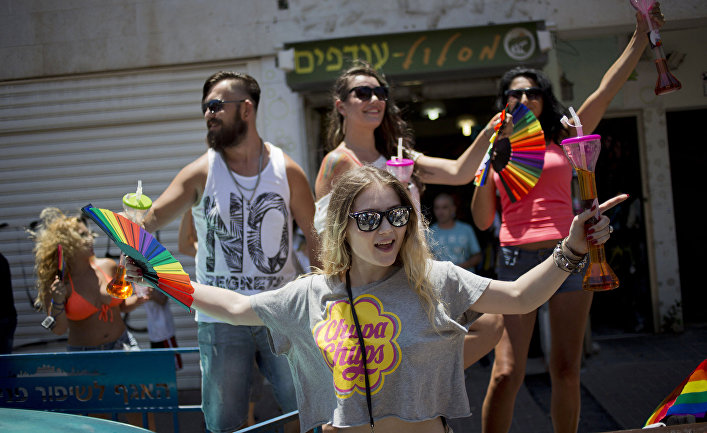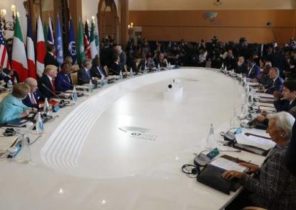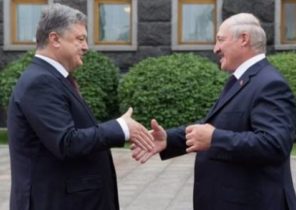
On the stage a young man. He tells how when he confessed to his mother that he’s gay, she took it in. But encouraged him to raise funds in order to make him an operation, indicating that the low level of awareness about this topic in Peru. Then the girl-pansexual tells about his first experience with another girl. The student is transgender describes in detail, illustrating the story with drawings on the Board, twenty-two operations that he underwent in order to obtain the male body. Then we hear the story of a transsexual about how in childhood he was not allowed to dance at the school concert in a dress, and it is with anger, we have set a goal to become the first among dancers.
The LGBT community launched two years ago the project of the theater, where everyone can share their stories. In this project, the team of “I’m not afraid” gave the sound a new theme of the struggle against homophobia in the society and various institutions of Peru, as well as the theme of the struggle for their rights, focusing rather on the emotional side of the issue, rather than on purely political rejection of this phenomenon.
At the moment, put three pieces: gays, lesbians, transgender, intersex, bisexual and “queers” go on stage and talk about themselves. This is an attempt to overcome through art the prejudice and lack of knowledge due to which these people are discriminated against.
The initiative belongs to the artist, the activist gay movement, Gabriel de La Cruz (Gabriel de la Cruz). He participated in the theatrical production, which has openly declared that he is gay. Peruvian LGBT community warmly welcomed this step. “And then I realized that we are poorly represented at the sites of cultural significance,” says de La Cruz.
LGBT characters is completely absent, as noted by the actor nor the theatre or the cinema, or on television. “If we appear on the stage or on the screen, it is only as the object of condemnation and ridicule. And then I realized that is very important to say: “Here we are, and here is our history.” And to make these stories that we tell ourselves.” So he decided to gather a group of activists and with them to create a band called “I am not afraid” to work for the benefit of LGBT people through art, but without leaving behind the creativity part of the political context.
The first step was a campaign in social networks to collect stories of abuse faced by the participants of the Peruvian team, with the help of which was written a report offering an analysis and evaluation of the situation. At the same time, it was delivered to work “Outside”, which tells about “how LGBT people live in Lima”. To Gabriel de La Cruz this was his directorial debut. Girl pansexual, male-shemale, female-shemale, gay, who for 23 years was married and has 4 children and “queer”, are in the stage of transition from woman to man, reveals different aspects of his life through monologues and interactions between them.
“We start his story from the time when we were students, says Little, machuca (Malú Machuca), the girl-pansexual. “I tell you about my first experience with another girl about how you perceive your body, about what people tell you on the street, what is your relationship with the father.” All this is seasoned with a variety of colors and tones from comic to the dramatic and is interwoven with incidents from the life that can happen to any of us. “This is a completely ordinary cases. We’re not talking about anything extraordinary. We want people to see that they have a lot in common with people from the LGBT what they usually do not notice. Because each, for example, a father” — continues to tell Little.
The sociologist who is represented as sebenarnya transandina activist, recalls that the project was immediately interested in her, because at that time in Congress actively discussed the draft law on civil marriage, which gave persons of one sex exclusively with property rights. However, she saw that the only thing what he was talking about the media in their coverage of the LGBT community, were questions of “romantic relationship within couples and protects a range of rights, including property, things, machines and stuff, right, which most of us are deprived of”.
“We felt what they say is not enough. There were other, much more mundane history. Most of us don’t have a partner, there are many people in age, both boys and girls, but they are all silent,” expresses his critical opinion of the sociologist. “I’m not afraid” I tried to close this gap through theatre. In the formulation of the “Outside” were not just people: we come from different places, belong to different social and economic strata, different skin color”.
This diversity is reflected in subsequent productions. In “Monster under my bed” six gay men talk about how they opened up their mothers and how they responded to it. In the production of “On the other side of the mirror” four female transsexual, the representatives of the groups most affected by the violent manifestations of homophobia, “talking about another, less feminine manner to be a woman,” says de La Cruz.
Activists of the “I’m not afraid” I feel that, revealing through culture, going public and telling their stories, they resist the flow of lies about the LGBT community in Peru, which leads to discrimination.
“We want people to look at a number of issues related to homophobia,” says Orlando Sosa (Sosa Orlando), boy gay involved in the production of “Monster under my bed”. “Of course, this can not happen immediately, but our performances help to break the status quo and to make people gradually change their opinion.”
In addition, this new tool to attract the attention of politicians and claim their rights. “Our daily reality is the result of ignorance on the subject, inequality and violence at the level of state institutions,” says Marco Perez (Marco Pérez), a young transgender involved in the formulation of the “Outside”.
In addition to performances in cultural centers, museums and universities, the activists organized a special presentation for congressmen, inviting representatives of the legislature from all parties, including the most negative-minded in relation to their activities.
Malu says that many politicians, previously refused to speak with them, after the views expressed readiness for dialogue. “We see the empathy, feel the difference. It is very important that we are given to speak first, in miserable conditions. The theatre serves as a kind of excuse to get people to listen to the LGBT community.”
Marco stresses that “relations between politicians and the LGBT community used to be too confrontational, some too much required, others are rejected”. The theatre also allows “another to achieve empathy” gives people “the opportunity to realize what was happening, rejecting the dry and lifeless statistics”. “Art sharpens the senses,” he says.
These productions don’t just help bring the LGBT people of understanding among the rest of mankind, they are a balm on the wounds of these rejected people and even got a purely practical application.
“We gave people the opportunity to come out to her family, to say in the voice that they are gay or transvestites, says Marco. After the show we often saw groups of people hugging and crying. It is very difficult to tell your family that you are LGBTQ. But seeing how the relatives react to our play, feeling, as they perceive it, many people dared this.”
Orlando (Orlando) talked about his familiar gay, whose parents learned of his sexual orientation purely by chance and have responded very sharply. His relationship with them has deteriorated so much that he was kicked out of the house. He invited mother to the show without telling her what was going on. “They sat in the first row, and from the very first moment really empathized with the actors, breaking down in tears in the voice in the middle of the presentation. In the end, she embraced his son and asked him for forgiveness.”
One of the activists said “the Monster under my bed” has helped some mothers, supporters of same-sex love “to see that they are not alone. Before many of them thought when they encountered this “problem”, and they just didn’t know how to react.”
In the formulation the main characters face different reactions of the parents, a full understanding of natural relationships to “ignoring the question and trying to pretend that nothing happened, and finally, religious fanaticism, when parents say that their children should burn in hell for what they have are who they are”.
One of the participants in the show invited her godfather, “pronounced homophobe”, and after the presentation he asked for forgiveness for his jokes about homosexuals and said he was proud of them.
Gabriel de La Cruz emphasizes that they have made a breakthrough in breaking away from the stereotypes of images of members of the LGBT community in the theater. “Now, when someone wants to make the LGBT statement, write to us turn to us for advice. I can’t call myself as expert, but I like it because it is a gesture of respect towards LGBT people, at least on stage.” One of the TRANS-women from “Outside” is very popular among aspiring actors who ask about meeting with her to play on stage her characters.
Little machuca, recently replaced de La Cruz as the main coordinator of the “I am not afraid”, said that currently the acting team tries to discover new artistic directions in order to continue to carry his message and to fight for their rights through art. “We continue theatrical productions, this trend has not exhausted itself. But this is only part of our repertoire. We want to discover new forms, primarily the visual and conceptual,” she says.







